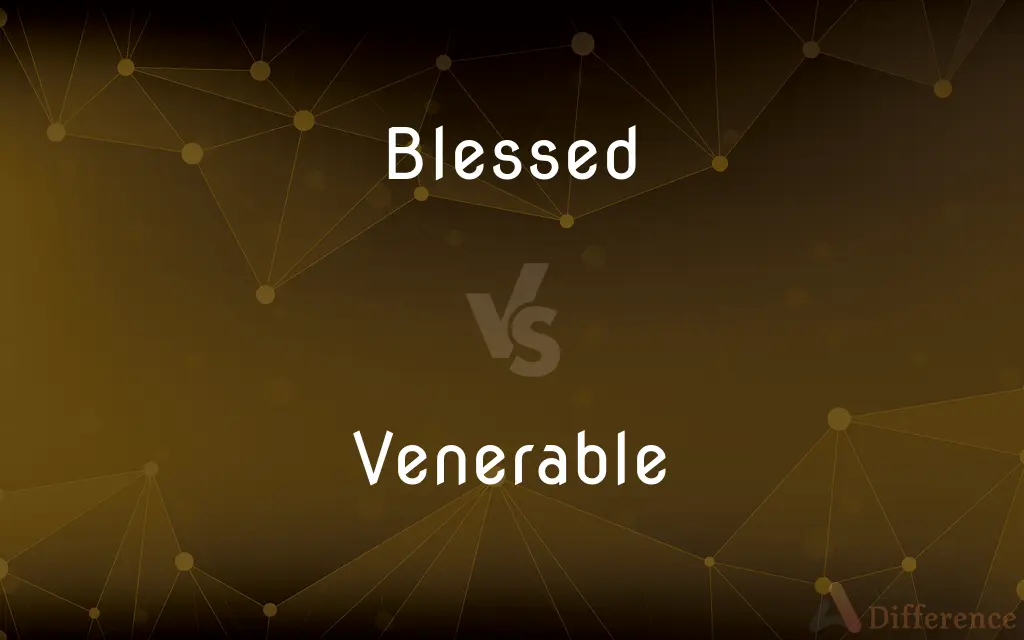Blessed vs. Venerable — What's the Difference?
By Tayyaba Rehman & Urooj Arif — Updated on April 6, 2024
"Blessed" is someone who receives divine favor or is sanctified, used in religious contexts, while "venerable" describes someone worthy of respect or reverence due to age, wisdom, or character, frequently applied in both secular and religious settings.

Difference Between Blessed and Venerable
Table of Contents
ADVERTISEMENT
Key Differences
In religious contexts, particularly within Christianity, being "blessed" connotes a state of sanctification or having been conferred with divine favor, often as a precursor to sainthood. It implies a spiritual grace or being in a state favored by the divine, as seen in various religious texts and traditions. On the other hand, "venerable" is a term that signifies a great deal of respect or reverence afforded to someone, often because of their age, wisdom, or notable contributions to society or a particular field. In religious orders, such as the Catholic Church, "venerable" is also a formal title in the canonization process, denoting a deceased person who has lived a life of heroic virtue.
While "blessed" often carries a more explicit spiritual or divine connotation, indicating a special favor or grace from a deity, "venerable" emphasizes the respect and admiration someone earns through their actions, character, or contributions. The distinction can also reflect the recognition by others, where being "blessed" may be perceived internally or by divine acknowledgment, and being "venerable" is recognized by the community or society at large.
The use of "blessed" can extend beyond religious contexts to express a feeling of gratitude or joy in everyday language, such as feeling blessed for one's family or fortunes. Conversely, "venerable" remains largely formal and is used to denote a high level of esteem or honor, often within institutional, academic, or organizational settings, in addition to its religious applications.
The difference between being "blessed" and "venerable" lies not only in the source of the acknowledgment—divine versus societal—but also in the nature of the acknowledgment itself: spiritual grace versus respect earned through virtue or contribution. Both terms, however, share a commonality in their positive connotations and the high regard they signify.
Comparison Chart
Definition
Receiving divine favor or sanctified; sanctification.
Worthy of respect or reverence due to age, wisdom, or character.
ADVERTISEMENT
Context
Often religious, but can be used in general expressions of gratitude.
Both secular and religious, including formal titles in certain contexts.
Connotation
Spiritual grace or divine favor.
Respect and admiration earned through actions or contributions.
Recognition
Divine or internal acknowledgment and by others in religious contexts.
By the community, society, or institution; often a formal acknowledgment.
Usage
Beyond religious texts, used to express gratitude or happiness in everyday life.
Mostly formal, to denote esteem or honor in various settings, including academic and religious.
Compare with Definitions
Blessed
Favored by divine grace.
The blessed saint performed many miracles.
Venerable
Commanding reverence based on character.
The venerable leader inspired many with her integrity.
Blessed
Sanctified or holy.
The blessed chalice was used during the ceremony.
Venerable
A formal title in religious canonization.
The Venerable Bede is a significant figure in ecclesiastical history.
Blessed
Expressing happiness or gratitude.
I feel blessed to have such a loving family.
Venerable
Worthy of great respect due to age or wisdom.
The venerable professor was celebrated for his groundbreaking research.
Blessed
Conferred with divine favor.
The blessed individuals were known for their kindness.
Venerable
Esteemed for contributions to a field.
The inventor became venerable in the scientific community.
Blessed
Joyful or fortunate.
We were blessed with good weather for our wedding.
Venerable
Revered due to noble qualities.
His venerable disposition earned him widespread admiration.
Blessed
Made holy; consecrated
The Blessed Sacrament
Venerable
Commanding respect by virtue of age, dignity, character, or position.
Blessed
Used in mild expressions of annoyance or exasperation
He'll want to go and see his blessed allotment
Venerable
Worthy of reverence, especially by religious or historical association
Venerable relics.
Blessed
Worthy of worship; holy.
Venerable
Roman Catholic Church Used as a title for a person who has reached the first stage of canonization.
Blessed
Held in veneration; revered.
Venerable
Used as a form of address for an archdeacon in the Anglican Church or the Episcopal Church.
Blessed
Blessed Roman Catholic Church Used as a title before the name of one who has been beatified.
Venerable
Commanding respect because of age, dignity, character or position.
Blessed
Bringing happiness, pleasure, or contentment.
Venerable
Worthy of reverence.
Blessed
Blessed Used as an intensive
I don't have a blessed dime.
Venerable
Ancient, antiquated or archaic.
Blessed
Having divine aid, or protection, or other blessing.
Venerable
Made sacred especially by religious or historical association.
Blessed
(Roman Catholicism) A title indicating the beatification of a person, thus allowing public veneration of those who have lived in sanctity or died as martyrs.
Venerable
Giving an impression of aged goodness and benevolence.
Blessed
Held in veneration; revered.
Venerable
Capable of being venerated; worthy of veneration or reverence; deserving of honor and respect; - generally implying an advanced age; as, a venerable magistrate; a venerable parent.
He was a man of eternal self-sacrifice, and that is always venerable.
Venerable men! you have come down to us from a former generation.
Blessed
Worthy of worship; holy.
Venerable
Rendered sacred by religious or other associations; that should be regarded with awe and treated with reverence; as, the venerable walls of a temple or a church.
Blessed
Damned as an intensifier or vehement denial
Not one blessed person offered to help me out.
I'm blessed if I'm going to drive all that way at this time of night.
Venerable
Impressive by reason of age;
A venerable sage with white hair and beard
Blessed
Simple past tense and past participle of bless
Venerable
Profoundly honored;
Revered holy men
Blessed
Hallowed; consecrated; worthy of blessing or adoration; heavenly; holy.
O, run; prevent them with thy humble ode,And lay it lowly at his blessed feet.
Blessed
Enjoying happiness or bliss; favored with blessings; happy; highly favored.
All generations shall call me blessed.
Towards England's blessed shore.
Blessed
Imparting happiness or bliss; fraught with happiness; blissful; joyful.
Blessed
Enjoying, or pertaining to, spiritual happiness, or heavenly felicity; as, the blessed in heaven.
Reverenced like a blessed saint.
Cast out from God and blessed vision.
Blessed
Beatified.
Blessed
Used euphemistically, ironically, or intensively.
Not a blessed man came to set her [a boat] free.
Blessed
Highly favored or fortunate (as e.g. by divine grace);
Our blessed land
The blessed assurance of a steady income
Blessed
Worthy of worship;
The Blessed Trinity
Blessed
Expletives used informally as intensifiers;
He's a blasted idiot
It's a blamed shame
A blame cold winter
Not a blessed dime
I'll be damned (or blessed or darned or goddamned) if I'll do any such thing
He's a damn (or goddam or goddamned) fool
A deuced idiot
Tired or his everlasting whimpering
An infernal nuisance
Blessed
Roman Catholic; proclaimed one of the blessed and thus worthy of veneration
Blessed
Enjoying the bliss of heaven
Blessed
Characterized by happiness and good fortune;
A blessed time
Blessed
Having good fortune bestowed or conferred upon; sometimes used as in combination;
Blessed with a strong healthy body
A nation blessed with peace
A peace-blessed era
Common Curiosities
What makes someone "venerable" in secular terms?
In secular terms, someone becomes "venerable" by earning great respect or reverence, usually due to their age, wisdom, character, or significant contributions to society or a field.
What does it mean to be "blessed" in a religious sense?
In a religious sense, being "blessed" means having received divine favor or grace, often associated with sanctity or spiritual joy.
Can the term "blessed" be used outside of religious contexts?
Yes, "blessed" is often used in everyday language to express feelings of gratitude, joy, or being fortunate.
Is there a formal process for being recognized as "blessed" or "venerable"?
In the Catholic Church, there are formal processes for being recognized as "blessed" (beatification) and "venerable" (a step in the canonization process), involving verification of virtues or miracles.
What is the significance of being called "blessed" or "venerable"?
Being called "blessed" signifies divine favor or spiritual grace, while being called "venerable" denotes a high level of respect or reverence due to one's life, actions, or contributions.
How does the community play a role in someone being seen as "venerable"?
The community's respect and admiration for an individual's wisdom, contributions, or character significantly contribute to them being regarded as "venerable."
Who can be considered "venerable" in religious contexts?
In religious contexts, particularly in the Catholic Church, "venerable" refers to a deceased person recognized for living a life of heroic virtue, a step in the process toward canonization as a saint.
Can anyone become "blessed" or "venerable"?
Theoretically, anyone who meets the religious or societal criteria for divine favor, virtuous living, or significant contributions can be considered "blessed" or "venerable," though formal religious titles have specific requirements.
Are there ceremonies associated with becoming "blessed" or "venerable"?
In the context of the Catholic Church, ceremonies and formal announcements are part of recognizing someone as "blessed" or declaring them "venerable," though secular recognition of venerability may not involve a ceremony.
Can the terms "blessed" and "venerable" overlap in meaning?
While the terms can overlap in conveying a sense of high regard or special status, their core meanings—divine favor versus earned respect—distinguish them in most contexts.
Share Your Discovery

Previous Comparison
Rod vs. Wire
Next Comparison
Glimmer vs. SparkAuthor Spotlight
Written by
Tayyaba RehmanTayyaba Rehman is a distinguished writer, currently serving as a primary contributor to askdifference.com. As a researcher in semantics and etymology, Tayyaba's passion for the complexity of languages and their distinctions has found a perfect home on the platform. Tayyaba delves into the intricacies of language, distinguishing between commonly confused words and phrases, thereby providing clarity for readers worldwide.
Co-written by
Urooj ArifUrooj is a skilled content writer at Ask Difference, known for her exceptional ability to simplify complex topics into engaging and informative content. With a passion for research and a flair for clear, concise writing, she consistently delivers articles that resonate with our diverse audience.
















































